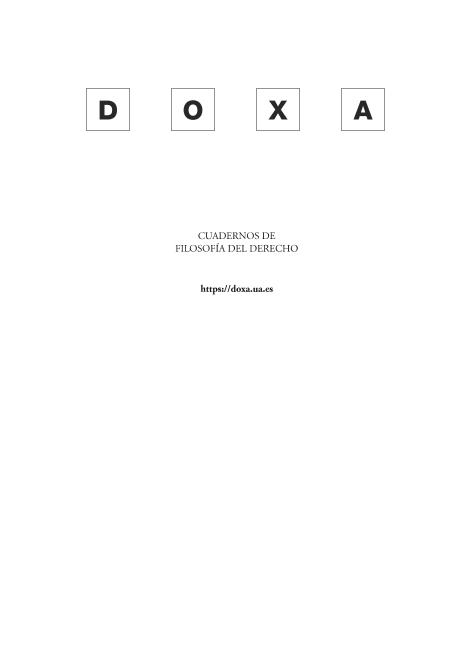Mostrar el registro sencillo del ítem
dc.contributor.author
Parmigiani, Matías

dc.date.available
2021-11-17T22:57:22Z
dc.date.issued
2019-12
dc.identifier.citation
Parmigiani, Matías; El alcance justificatorio del consentimiento tácito. El problema de Locke y la lógica del beneficio; Universidad de Alicante; Doxa (Alicante); 43; 12-2019; 403-432
dc.identifier.issn
0214-8676
dc.identifier.uri
http://hdl.handle.net/11336/147125
dc.description.abstract
Afirma John Locke en el Capítulo VIII de su Segundo tratado sobre el gibierno civil que «todo hombre que tenga posesiones o disfrute de alguna parte de los dominios de cualquier gobierno, está por ello dando su tácito consentimiento de sumisión». Según esta tesis, quien es beneficiado mediante cierta forma de trato, brindaría por eso mismo una suerte de consentimiento tácito al mismo, a menos que exprese lo contrario. El objetivo de este trabajo consiste en analizar críticamente el vínculo que establece Locke entre el consentimiento y la idea de beneficio. Para ello, apelaré a una semántica centrada en las razones personales o agencialmente relativas para actuar, que son las que explican en última instancia, según argüiré, el poder justificatorio del consentimiento en los distintos ámbitos normativos de nuestra vida.
dc.description.abstract
In Chapter VIII of his Second Treatise on Government John Locke claims that «if a man owns or enjoys some part of the land under a given government, while that enjoyment lasts he gives his tacit consent to the laws of that government.» According to that claim, whoever is benefited through a certain form of treatment would offer for that very reason a kind of tacit consent to it, unless s/he expresses the contrary. The goal of this paper is to critically analyze the link between consent and the idea of the beneficial as figured out by Locke. To this end, I will appeal to a semantics centered on personal or agent-relative reasons for action, which are the reasons that ultimately explain, as I will argue, the justificatory power of consent in the different normative domains of our life.
dc.format
application/pdf
dc.language.iso
spa
dc.publisher
Universidad de Alicante
dc.rights
info:eu-repo/semantics/openAccess
dc.rights.uri
https://creativecommons.org/licenses/by-nc-sa/2.5/ar/
dc.subject
CONSENTIMIENTO
dc.subject
LOCKE
dc.subject
BIENESTAR
dc.subject
RAZONES
dc.subject.classification
Ética

dc.subject.classification
Filosofía, Ética y Religión

dc.subject.classification
HUMANIDADES

dc.title
El alcance justificatorio del consentimiento tácito. El problema de Locke y la lógica del beneficio
dc.title
The scope of justification of tacit consent. Locke's problem and the logic of the beneficial
dc.type
info:eu-repo/semantics/article
dc.type
info:ar-repo/semantics/artículo
dc.type
info:eu-repo/semantics/publishedVersion
dc.date.updated
2020-11-19T21:07:41Z
dc.identifier.eissn
2386-4702
dc.journal.number
43
dc.journal.pagination
403-432
dc.journal.pais
España

dc.journal.ciudad
Alicante
dc.description.fil
Fil: Parmigiani, Matías. Universidad Nacional de Córdoba. Centro de Investigaciones Jurídicas y Sociales. Consejo Nacional de Investigaciones Científicas y Técnicas. Centro Científico Tecnológico Conicet - Córdoba. Centro de Investigaciones Jurídicas y Sociales; Argentina
dc.journal.title
Doxa (Alicante)

dc.relation.alternativeid
info:eu-repo/semantics/altIdentifier/url/https://doxa.ua.es/article/view/2020-n43-el-alcance-justificatorio-del-consentimiento-tacito-el-problema-de-locke-y-la-logica-del-beneficio
dc.relation.alternativeid
info:eu-repo/semantics/altIdentifier/doi/http://dx.doi.org/10.14198/DOXA2020.43.05
Archivos asociados
